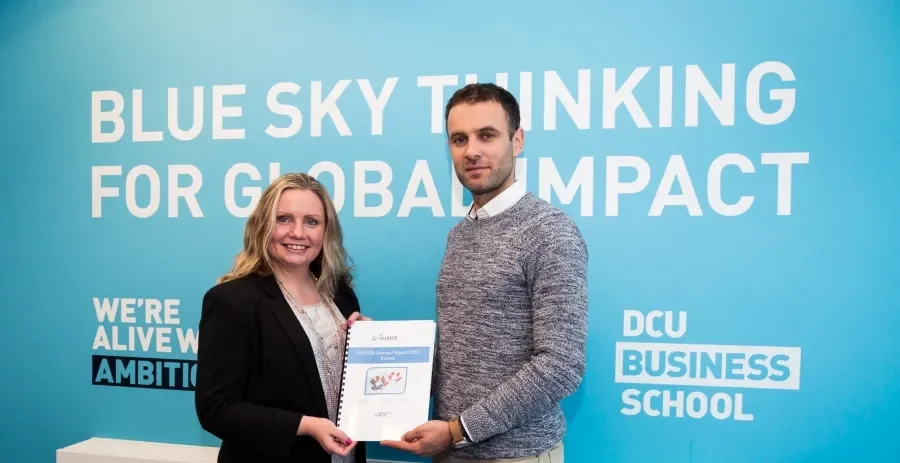

DCU research reveals entrepreneurial intentions of third-level students in Ireland
New DCU research reveals entrepreneurial intentions of third-level students in Ireland
Key findings:
- 1 in 2 (44%) intend to follow a career with medium to large sized businesses post-graduation
- 1 in 4 (27%) see themselves as an entrepreneur or founder working in their own business five years’ post-graduation
- 1 in 10 (11%) are in the process of setting up their own company
- 1 in 7 (15%) are determined to start their own business in the future
- Of those linked to family businesses, the majority (84%) indicated a plan to succeed their parents
- Students feel their institution has a favourable climate for entrepreneurship
Researchers at Dublin City University have analysed the entrepreneurial intentions and activities of third level students in Ireland. The research also looks at factors affecting a student’s perception and pursuit of entrepreneurship and how education is supporting that process.
The study forms part of a global research initiative, The Global University Entrepreneurial Spirit Students’ Survey (GUESSS), which examines responses of 122,000 students in 50 countries. Sponsored by Enterprise Ireland, the GUESSS National Irish Report 2017 is authored by Dr Eric Clinton and Roisin Lyons of DCU’s Business School.
Results show that immediately post-graduation the majority (44%) of students in Ireland would like to begin their career with a medium to large-sized business. Interestingly, when asked where they saw themselves five years’ post-graduation, the highest ranked career path is as an entrepreneur/founder, with 27% indicating their intention of working in their own business at stage.
One in ten respondents (11%) are currently trying to set up their own company while one in seven (15%) have seriously thought about starting a business and are determined to choose this path in the future.
Speaking on the report, Roisin Lyons, lecturer in entrepreneurship and innovation at DCU, said:
“The project allowed us to profile entrepreneurship in our third level institutions and benchmark our programmes against a global audience of over one hundred and twenty thousand students in 50 countries.
“We, as academic institutions, can now speak with some authority about the career choice intentions of students in Ireland, education aiding student entrepreneurship, and what we know about aspiring and active student entrepreneurs.”
Of those students who indicated a link with family business, the majority (84%) specified that they planned to succeed their parents. The primary reason cited was the desire to ‘preserve family harmony’ and the second most important factor being the need to ‘secure long-term survival of the business.’
When asked if they felt education was aiding student entrepreneurship, participants across all institutions answered positively. They felt their institution encouraged them to engage in entrepreneurial activities and provided a favourable climate for entrepreneurship.
Commenting on these findings, Dr Eric Clinton, lecturer in entrepreneurship and director of the Centre for Family Business at DCU, said:
“This research provides interesting insights about family businesses and succession in the next generation. Academic institutions need to foster this entrepreneurial mind-set and assist the next generation of business owners to start their own firm or engage in the family business succession process. We expect this research to stimulate and encourage further analysis, debate and positive action in understanding and supporting entrepreneurship education in Ireland”.
Gillian Slattery, Regional Development Executive, Enterprise Ireland added:
“Enterprise Ireland looks at the Global University Entrepreneurial Spirit Students' Survey as an important tool to examine student’s intention on starting their own business once they graduate. The findings of the report will be vital to adapt policy and programmes which encourage youth or graduate entrepreneurship such as the Student Entrepreneur Awards.”
The responses of over 800 students across a number of third level institutions in Ireland were analysed for the purpose of this national report. The majority (72%) of those aged 18 - 23.
The full report is available for download http://www.guesssurvey.org/resources/nat_2016/GUESSS_Report_2016_Ireland.pdf
Pictured: Gillian Slattery, Enterprise Ireland and Eric Clinton, DCU
